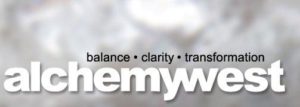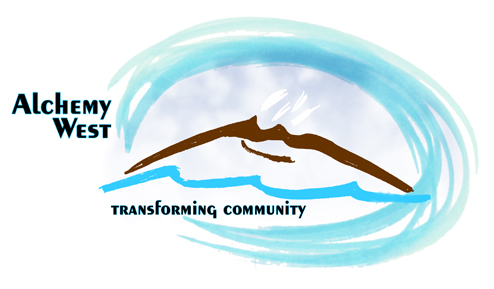 The lure of immortality dances through our lives, weaving delicate patterns that tease us with the possibility.
The lure of immortality dances through our lives, weaving delicate patterns that tease us with the possibility.
To live forever.
And then, of course, we don’t.
Honestly, I never expected to live forever. You’re born, crap happens, fun happens, you die. Nope, I never expected to live forever, and I didn’t, either: last February I died of the flu, and, sure, I obviously came back, but I still died. At home in bed with my kids: my dogs, Murphy and Alki, and Grace the Cat.
I never thought Murphy would live forever. My dog. My eldest. She had so many things go wrong early in her life, we were surprised she made it to 3 and celebrated when she hit 5.
Today, January 16, 2012, she is 13-1/2. She’s been healthy and vigorous since she was 5. Mostly. There’s arthritis, things like that.
But to think of “Murphy” and “old age” astonishes me. I’m still more astonished that, somewhere along the way, deep down inside, I thought she would live forever. What an idiot I can be.
I just never expected it: either Murphy’s old age or, then, Murphy dying. I should know better, since I was only 9 when the first person I thought was immortal died, and I’ve lost many people and several animals since then. But somehow I just assumed that Murphy would skip that phase.
And now in the last few weeks I’ve learned that she is dying. Purely by accident, since I am the super careful slightly neurotic overly analytical intuitive, we discovered that she has a tumor on her spleen.
Murphy is dying.
Somewhere in the last few days I decided to record our last journey together, from the shock of discovery to the agony of choice to the stupid things you think of when someone you love is dying. A running journal. The story of almost immortal.
I know how it’s going to end. I don’t know when. I only know it happens a little bit with every breath I take, I can feel it.
 The human-animal bond is a strange and wonderful thing. Living a multi-species family life is both inspiring and terrifying: every day you should be realizing that it’s one less day, not one more, but you don’t. You can’t.
The human-animal bond is a strange and wonderful thing. Living a multi-species family life is both inspiring and terrifying: every day you should be realizing that it’s one less day, not one more, but you don’t. You can’t.
Living an intuitive life where you know that all life is equal is also a strange and wonderful thing. You learn about choice, about individual choice, and family choice, and community choice. It’s beautiful. Terrifying. Absurd.
Real life is about choice. Crappy choices are part of it. How do you live, and die? What does it look like? Why should we share it? What can it mean for our lives in community, for our lives as humans with animals, and homes, and businesses, all wrapped up in the mystery of nature and of the planet itself?
What happens when someone you love is dying?
Once again, I’m going to find out. Write about it. Maybe see what you think.
Will it be cathartic? Maybe. Angry? You bet. Resigned? Never. Goofy and absurd? Most likely. True? Every single word.
Even in my most optimistic moments I can’t see anything positive coming from this, because at the end Murphy will be gone.
But something is coming.
We shall see.
© 2011 Robyn M Fritz
![GreenVoteYes[1]](http://www.alchemywestinc.com/blog/wp-content/uploads/2011/09/GreenVoteYes1.jpg) My mom loved Southwest art. My dad loved my mom. I loved them. When the eagle kachina dropped into our lives, I was greedily snatching as much time with them as I could, building memories.
My mom loved Southwest art. My dad loved my mom. I loved them. When the eagle kachina dropped into our lives, I was greedily snatching as much time with them as I could, building memories. 
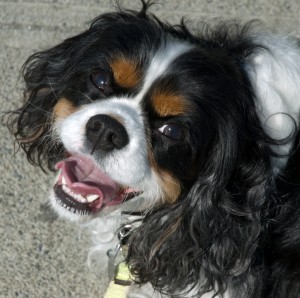 When my youngest dog, Alki, became deaf, I had to figure out how I could make him comfortable with his handicap. How to make us all comfortable: Alki, my nearly 10-year-old Cavalier; his 12-year-old Cavalier sister, Murphy; Grace the Cat; me; and friends, family, and visiting clients.
When my youngest dog, Alki, became deaf, I had to figure out how I could make him comfortable with his handicap. How to make us all comfortable: Alki, my nearly 10-year-old Cavalier; his 12-year-old Cavalier sister, Murphy; Grace the Cat; me; and friends, family, and visiting clients.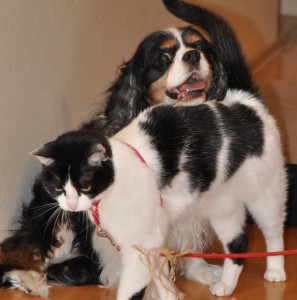
 We were afraid for awhile, but ultimately we chose love in our multi-species family. Alki chose love.
We were afraid for awhile, but ultimately we chose love in our multi-species family. Alki chose love. My son is deaf. My youngest dog, my Velcro boy, my goofy sweet Alki, is stone cold deaf.
My son is deaf. My youngest dog, my Velcro boy, my goofy sweet Alki, is stone cold deaf.

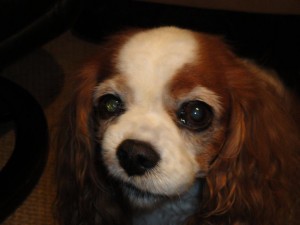 Have you always wanted to talk with an animal? And hear it talk back?
Have you always wanted to talk with an animal? And hear it talk back?



